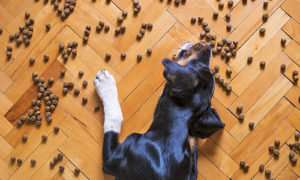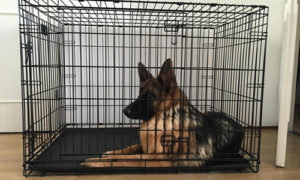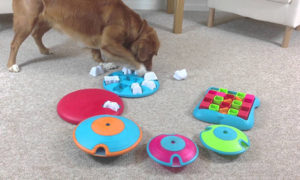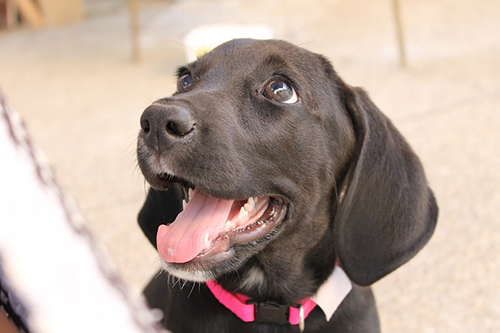
Taking home a new dog or puppy can be an exciting time for the whole family. You can expect plenty of tail wags, cuddles, and sloppy doggy kisses. However, if you don’t have a new dog checklist, things can go from bad to worse real quick. You need to have specific items for your new addition, ready and waiting.
Dr. Sandra Mitchell, owner of All Creatures Veterinary Services in Bangor, Maine, believes people forget that moving a new dog into the home can be stressful for them. Therefore, it is essential not to overwhelm them so that it can be easier to adjust to their new surroundings.
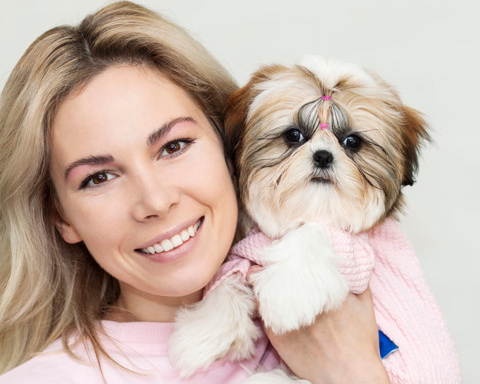
Dr. Mitchell’s recommendation is to allow your new dog to have her own space, such as a bathroom or another smaller room in the house. Therefore, you can provide downtime as well as introductions to family, friends, and other items on a staggered basis.
Also, it is essential to have the necessary dog supplies already on hand, which helps to ensure a smoother transition. You will need the essentials such as dog food, poop bags, training tools, dog collars, training leash, and a kennel or dog crate for crate training.
New dog checklist for the first thirty-six hours
- Dog food: Preferably, get the dog food your dog was eating before you brought him home; this will prevent stomach problems. However, you can transition him to the dog food that you and your vet think is best at a later date. The right nutrition is, of course, on the top of any new dog checklist.
- Food and Water Bowls: This one is obvious; you will need something to feed your new canine companion with as well as keep him hydrated.
- Collar and ID tag: Remember that your dog is in a new environment; therefore, it is only wise to equip him with an ID tag and collar in the case of him getting lost, so retrieving him would be more comfortable.
- Leash: Dr. Mitchell recommends a leash for neighborhood walks as well as leash training, which begins the process of setting house rules immediately.
- Poop Bags: Depending on where you live, it is mandatory to clean up after your pet. However, even if you live somewhere, it is not compulsory; it is best to do it anyway. Don’t be that neighbor that doesn’t clean up after his dog.
- Dog Crate: Crates are crucial for training as well as giving your dog its own space. Dr. Mitchell recommends crate training on the first day you bring your new canine home.
- Dog Treats: Treats are essential because you want to reward good behavior. They’re also suitable for bonding with your new friend.
- Dog Bed: Your new puppy needs a comfortable place to lay its head.
- Toys: Toys are great for mental and physical stimulation. Use different toys for different activities.
- Calming Aids: Some older dogs tend to get nervous when in new surroundings. Therefore, calming items such as infused sprays with pheromones, calming collars, apparel that provides constant pressure, and calming supplements can go a long way.
The new dog shopping list above is for new dogs of any age. However, as you get to know your companion better, you can better tailor dog toys, leashes, and dog beds to their specific needs as well as preferences. Dr. Mitchell emphasizes that certain products after the first few days will depend on the dog’s personality.
The weather is also a consideration. You will need supplies depending on certain seasonal conditions. For instance, during the rainy season, dog boots are a must because they can help avoid cracked paws in your dog. Also, you’re going to have to provide specific care items depending on the different stages of your canine companion’s life.
New puppy shopping checklist
During this early stage, you should focus on exposing your puppy to new and stimulating things. This stimulation will allow your puppy to grow both mentally and physically and, at the same time, encourage good behavior. Check out the puppy essentials list below:
- Puzzle and Treat-Dispensing Toys: These puppy toys keep your new companion occupied as well as stimulating her mentally, which in turn keeps her out of trouble.
- Training Tools: You can also encourage good behaviors with dog clickers and doggy treats. The younger you start, the better.
- Chew Toys: Before investing too much into dog chews, consult with your vet about which product will be best for your pup.
- Potty Pads: These are essential items when housetraining.
- Dental Products: Brushing your puppy’s teeth will help prevent issues in the future. Therefore, get your puppy accustomed to the toothpaste and the toothbrush as early as possible.
- Grooming Products: Grooming is essential for your puppy’s skin and coat. Purchase dog shampoo and nail trimmers to get your puppy accustomed to being groomed.
- Flea and Tick Control: You can do research or talk to your vet about which product will be best for your puppy.
- Stain and Odor Remover: These pet products are a must when house training and potty-training puppies.
Outside of the new dog must-haves, Dr. Mitchell recommends showering your new puppy with ample attention and chances for socialization. She suggests investing in some form of puppy training instead of trying to do it on your own. It exposes puppies to different individuals and different dogs, which is crucial to normal development, according to Dr. Mitchell.
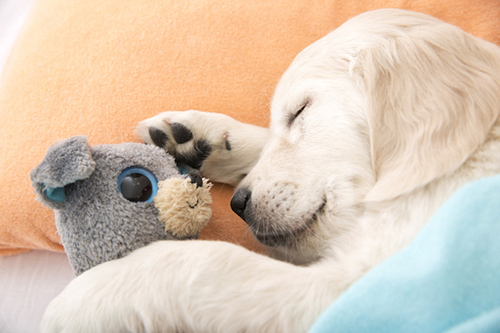
Also, for those high-energy pups, Dr. Mitchell endorses some form of doggy daycare for at least a couple of hours per week. Agility training is another way to help your puppy expel extra energy.
You will also need to schedule an appointment with your regular veterinarian right away, which is an essential part of any new dog checklist.
Puppies require to be vaccinated every 3-4 weeks as well as dewormed; therefore, schedule a veterinary appointment for your pet right away.
New dog checklist for specific life stages (Adult dog)
When putting together a dog adoption checklist, training products that help correct bad behavior and habits are essential. Adopted dogs are going to need training tools the most since these dogs are more likely to come with some reeducation needs. Furthermore, luxury objects naturally are more appropriate for this more mature life stage.
Older dogs have an appreciation for the finer things, such as a nice comfortable bed. However, puppies, on the other hand, could care less; they’ll probably just pee on it or chew on it.
- Training Tools: Assist with behavioral problems with tools like the no-pull harness and the anti-chew spray.
- Comfy Beds: Older dogs tend to enjoy luxurious things more so than their younger counterparts.
- Dental Products: Toothpaste, toothbrush, dental chews, and other dental products are essential in preventing dental disease.
- Grooming Products: Cleaning wipes, dog shampoo, dog brush, and nail trimmers are essential in keeping your dog fresh and clean.
- Flea and Tick Control: You and your vet should converse about which flea and tick products are right for your dog.
According to Dr. Mitchell, adult dogs and especially the high-energy ones could benefit from professional training or some form of doggy daycare, which is another essential addition to the new dog checklist.
New dog checklist for specific life stages (Senior dog)
When it comes to senior dogs, they tend to benefit more from particular products that remedy physical changes that come from aging. Unfortunately, most senior dogs will experience hearing and vision issues as well as limited mobility. Therefore, try to find products that aids with making their environment easy and safe to circumnavigate.
- Pet Steps or Ramps: Great products for helping your senior dog get onto the couch as well as into vehicles
- Supplements: More than likely, your senior companion will need hip and joint supplements. Therefore, get with your vet to find out which brand of supplements will be of the most significant benefit.
- Heated Orthopedic Pet Beds: These products will give your dog optimum support for those aching joints.
- Night light: This product is essential because it helps your dog see in areas where there is low lighting. You can place night lights where they sleep and also where they go outside to potty at night.
- Gripping Booties or Toenail Grips: These are products that are great for those senior dogs that have problems with slipping and falling.
- Lift Harness: A lifting harness is another excellent product on the senior dog essentials list that helps with mobility.
- Dog Stroller: Many senior canines are not able to walk long distances; with a pet stroller, you and your dog can experience the outdoors like the old times.
- Wheelchairs: Great for older dogs that cannot walk without help
- Doggy Diapers: Doggy diapers are a must-have because of the problem with incontinence in older dogs.
- Blankets and Sweaters: Older dogs tend to have issues with the cold. Therefore, on those chilly nights, a blanket or sweater is a must-have.
- Grooming Products: Cleaning wipes, dog shampoo, nail trimmers, and clippers will help keep your senior dog feeling like a million bucks.
- Dental Products: Older dogs tend to suffer from dental issues, which is why dental products such as toothbrush and doggy toothpaste are essential.
- Flea and Tick Control: A visit to your vet will set you on the right track of finding the best product for your dog. Flea and tick products are a top priority on any new dog checklist.
Also, Dr. Mitchell recommends a vet visit to ascertain the overall health of your senior canine companion.


